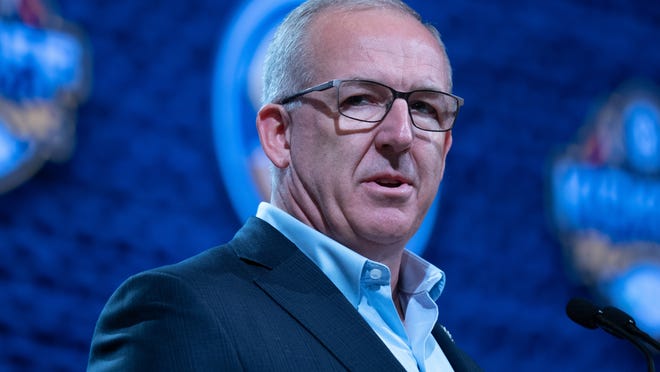House v. NCAA settlement is the hot topic at SEC spring meetings for coaches and ADs
 Richard Silva
Richard Silva
MIRAMAR BEACH, Fla. — The good news for college football coaches, athletics directors and university presidents, among others? The topic of scheduling − whether to play eight or nine conference games each year − has finally taken a backseat at SEC spring meetings.
The bad news? A new and perhaps even more polarizing issue has arisen.
The NCAA, SEC, Big Ten, Big 12, ACC and Pac-12 all recently voted in favor of a settlement in the House v. NCAA case. In abbreviated terms, the settlement is set to result in the NCAA paying former athletes about $2.8 billion in back damages, according to the USA TODAY Network. It also sets the groundwork for schools to directly pay athletes moving forward as a term of the settlement stipulates that schools will share with them in revenue.
"I think that's what we're here for, right? To try to figure that out," Georgia coach Kirby Smart said Tuesday at the first day of the 2024 SEC Spring Meetings. "There's a lot of speculation and a lot of narratives out there that are loose, that may not be true. We're here to figure that out."
AUBURN:Does Nike switch open door for alternate football uniforms? What AD John Cohen said
TIGERS HOOPS:Auburn adds 'last piece' with Georgia Tech transfer Miles Kelly
Added Alabama coach Kalen DeBoer: "I think it's just getting all the information. We hear things, you read things. I know that it's still in process right now, so trying to understand where it's really at and having that communication where we're all in a room together and really hearing the facts. Trying to separate what is real and what isn't real, I think that's where it starts."
With athletes set to get a slice of the revenue − at least $20 million to start, per the USA TODAY Network − athletic departments are expected to take cost-cutting measurements to afford the new expense. An idea floated by some is to cut non-revenue sports. If applied, how does Title IX factor in?
Texas A&M athletics director Trev Alberts, when asked if he could comfortably tell an athlete at his school that their program won't be cut, said it wouldn't be "wise" for anyone to make that promise as things currently stand, though he added he's not getting the sense from his colleagues that cutting sports is what they want to do.
"It's not fun," Alberts added. "It's a last resort."
As part of the settlement, roster limits are expected to take precedence over scholarship limits. Are walk-on opportunities completely taken away? A limited roster could impact how teams practice. With less players available, a common type of football practice called "two-spotting," which features a pair of offensive and defensive units working simultaneously, wouldn't be possible, according to DeBoer.
"You figure things out when that time comes, but obviously there's a model that's somewhat in that area. That's the NFL," DeBoer said. "You'd probably have to do some professional development in that area a little bit more than we've done over the years in regards to how they practice and how they do things."
And what happens to NIL collectives now that schools may be able to pay athletes directly?
"I've said it 100 times and I'll say it again: We don't have a revenue problem in college athletics, we have an expense problem," Alberts said. "Does this reframe our thinking? Does it create some discipline? Heretofore, It hasn't. ... The fundamental business of college athletics has been altered and changed forever, and I don't think that's necessarily a bad thing.
"It's just going to be different, and our ability to adjust and adapt will be critical. It is true that, historically, we've not been very good at that. Now, we're going to be in a position to change our past behavior."
Conversations surrounding the issue, amongst a bevy of other matters such as future scheduling, began Tuesday. Auburn coach Hugh Freeze said the coaches were presented with facts and were asked to return with some potential recommendations: "Maybe the SEC can take forward with the next steps," Freeze said.
Talks are set to continue Wednesday and Thursday.
"It's always easy to come up with a solution, and then the details happen," Alberts said. "Let's just be honest with ourselves: There's going to be unintended benefits of this, and there's going to be unintended consequences that we have not even thought about today.
"But I think you have to take the first step. You take the first step, you start working towards what the execution looks like and we're going to learn stuff along the way and we're going to have to do tough stuff. It's going to look different. But in the end, it's going to be OK. We're going to be OK."
Richard Silva is a sports reporters for the Montgomery Advertiser, part of the USA TODAY Network. He can be reached via email at rsilva@gannett.com or on X, formerly known as Twitter, @rich_silva18.